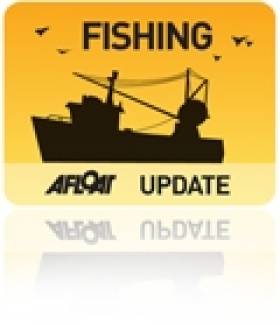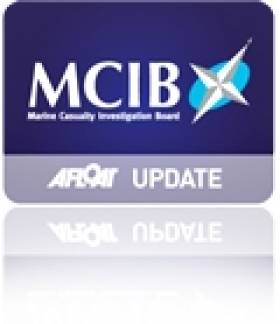Displaying items by tag: Ainmire
#MARINE NOTICE - The latest Marine Notice from the Department of Transport, Tourism and Sport (DTTAS) draws mariners' attention to the official report on the sinking of the fishing boat Ainmire and its recommendations for safety on board all fishing vessels.
As reported in September last year on Afloat.ie, the report by the Marine Casualty Investigation Board found that a breach in the engine compartment caused the Ainmire to take on water and sink off the coast of Scotland in April 2011.
The report concluded that the failure of a sea water cooling pipe in the engine room was the most likely cause of the flooding, and noted that the pipework had not been renewed during the life of the vessel.
Investigators also noted that the bilge pump was located under the floor plates in the engine room as was this inoperable when the water level rose in the compartment.
Marine Notice No 58 of 2012 - a PDF of which is available to read and download HERE - reminds fishing vessel operators that large sea-water inlets in engine rooms make their boats vulnerable to severe flooding if they fail.
It is recommended that these pipes should be checked for corrosion every year, especially around the welded joint at the hull. Ultrasonic thickness testing of the pipework should also be considered.
Moreover, such pipework can be eroded quickly by stray currents, so electrical equipment should be checked regularly, while the location of bilge pumps in the engine room should be carefully considered
MCIB Report on Sinking of Fishing Vessel 'Ainmire'
A breach in the engine compartment caused the fishing vessel Ainmire to take on water and sink off the coast of Scotland in April last year, according to the official report into the incident.
All crew on board the vessel were transferred safetly to another fishing boat that responded to its distress call, some 30 miles northwest of the Butt of Lewis on the morning of 29 April 2010.
The Marine Casualty Investigation Board (MCIB) report concluded that the failure of a sea water cooling pipe in the engine room was the most likely cause of the flooding, and pointed to the fact that the pipework had not been renewed during the life of the vessel.
It was also noted that the bilge pump and its motors were located under the floor plates in the engine room, and thus were inoperable when the water level had risen in the compartment.
In addition, the MCIB report found that the Ainmire has been operating without a Fishing Vessel Safety Certificate for more than six months at the time of the incident.
Though the owner had submitted a survey application and paid the required fee to the Marine Survey Office (MSO) the previous summer, a communication breakdown resulted in the required survey not being carried out before the expiration of the vessel's previous certification.
The MCIB advised boat owners and operators to be extra vigilant regarding the location of bilge pumps in their vessels.
It also warned that survey applications for certification "may not accommodate all situations", and that the issuing of a recepit is not a guarantee that an application is being dealt with.
The full report is available to download as a PDF from the MCIB website HERE.






























































